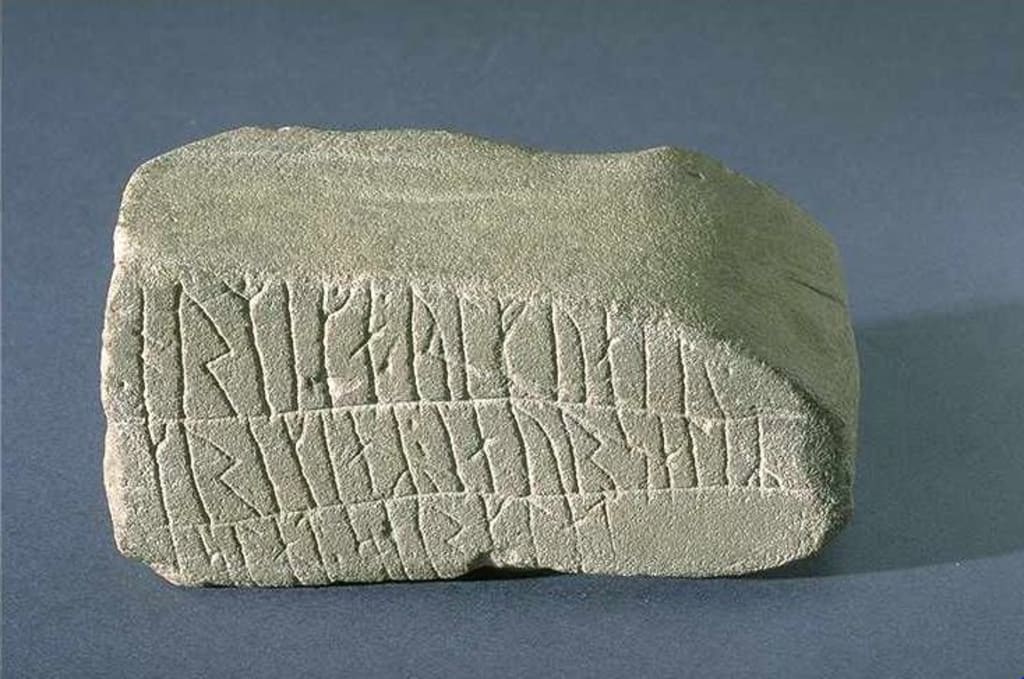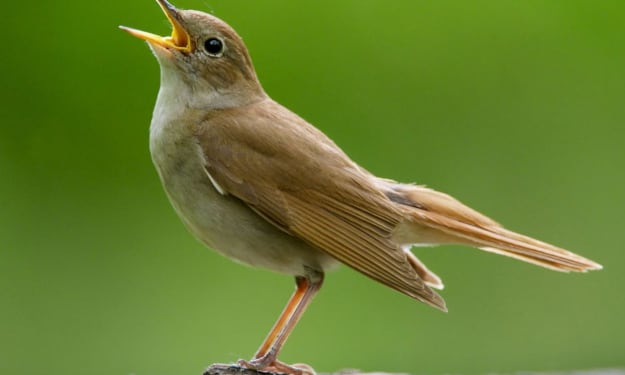The Mead of Poetry [told vocally online]\\:
my re-telling of the Norse myth of the origin of Poetry

It had started with the bitter strife that once played out between the Aesir and the Vanir, holy beings of Tree and Sky and Water. When this cosmic strife ended, they enacted quite a bizarre form of Peace-Treaty to cement their union.
There was a large kettle set in the midst of a wooded grove, which the gods from each party, two by two, approached and spat their holy sputum into. So that a token of this Peace-Treaty would last forever, they formed a Man from the spittle, whom they called Kvasir.
Kvasir was incredibly knowledgeable; there was not a question he couldn’t answer. So, he traveled about, far and wide, to know more of the world’s advice. He built upon the wisdom he already possessed with the gathered info.
So it was that he came to the homestead of two dwarfs, Fjallar and Gallar, who bid him come inside to share their hospitality and drink, and much intellectual conversation if he would accept their heartfelt invitation.
As soon as Kvasir had come to sit by their hearth, they murdered the all-witted being in their homestead, cutting his throat with a scythe. They drained his blood into two pots and a kettle, the one named Odreyr and the others Son and Bodn; after, they blended honey with the blood, active agents of fungal fermentation, and from it came to be that Mead that, whoever drinks from it, would become a Poet or Philosopher.
The dwarfs Fjallar and Gallar told the Aesir and Co., that ol’ Kvasir had gagged up his mother-wit in a vomitous frenzy, and choked piteously on his own wisdom and lore. The gods must have been crazy, or drunk, to believe them; but they did.
Anyway, this pair of brothers, Fjallar and Gallar, continued their serial-killing spree in secret. They invited some random Jotun over (A Giant or primordial being), named Gillingr with his wife Gillinga, for the enjoyment of more lovely company.
Fjallar and Gallar asked Gillingr to go sea-fishing with them, to which he gladly agreed, happy with the hospitality of these jolly dwarves. When they were out on the whale's-road far from land, Fjallar craftily overturned the boat, spilling poor Gillingr (who could not swim, oops!) into the ocean; he drowned, of course.
The psychopathic mead-brewers righted the capsized boat, and rowed merrily, merrily, merrily, back to shore. (Life is but a dream: death is a Viking unreality.) When the two conspirators told Gillinga that her husband had been nudged from boat by a huge swordfish, encircled fatally in the merciless waters, she did not take it well. She wept and wailed, flipped and flailed, until Gallar asked her soothingly if she would like to visit the place at sea where her bold husband had met his (ever so) untimely end?
She continued wailing, but agreed. Yet Fjallar had stationed himself on the big wooden lintel above the doorway exiting the homestead, bearing a burdensome millstone, and as she passed the threshold he dropped the stone strait upon the head of the Giant’s wife. This out-of-control duo were sadistically satisfied with their combined performance.
Suttungr, their outraged son, hearing of these senseless deeds, vowed vengeance for them. Using his Giant’s size and prowess, he seized Fjallar and Gallar from their homestead, and took them both to an island out at sea, one that was entirely submerged come high tide. He would have drowned them just as they had his father, if they hadn’t made an enticing offer. In exchange for their lives, cementing truce with them, they offered the precious Mead of Poetry, which made one a Poet and Sage.
Suttungr greedily accepted the offer, bringing the dwarf brothers back to land, to live happily ever after (presumably). The Mead, he bore away to hoard in a mountain called Hnitbjorg: he drank none of it, just stored it away, setting his sister Gunnlod over it as custodian in a seat of gold.
That's why poetry could be kenned superficially as Suttung’s Mead, or Life’s Lease from Sea, or the Waters of Hnitbjorg.
Do not imagine, dear listeners, that it was not long before Odin, god of wisdom and battles, heard of the existence of these Waters of Hnitbjorg. Being as he loved mead, and he loved poetry, he figured he just had to have this concoction. He even saw with his one eye thru the runes of his staff that this drink was fermented not only from honey, but from Kvasir’s blood, mark of the Peace-Treaty between the Aesir and the Vanir, and was therefore the property of the beings of Tree, Sky and Water.
He set forth to find it, and devised a trickster’s plan to get at it, even without Loki’s counsel this time. So he went among humans, taking the name of Bolverkr or Ill-Worker. He came to the property of Bragi, Suttung’s brother, as proxy for possessor of the mead.
He came upon a field where nine workers were mowing hay with scythes. He asked, if they wanted him to sharpen their blades. They yessed back at him all at once. He took a whetstone carved with runes from his belt, and sharpened the scythe of the nearest worker, who found that it cut much better afterwards.
With a generous gesture of his hand, Bolverkr asked the laborers who he should give the enchanted whetstone to, and of course the bedazzled men all answered me, me, me all at once, brandishing their scythes. Then, Ill-Worker tossed the whetstone aloft, as the workmen scrambled to obtain it, scythes all angled in disarray: each slashed the other’s throats in violent display, blood bespattering the earth and the hay with its flood. First part of the trickster’s plan, accomplished. But that is only the first obstacle, curious listeners.
He then approached the dwelling of Bragi, Suttung’s brother, who was irate over the loss of his nine workmen, all having inexplicably killed one another while mowing hay with their scythes. Dangerous work, that. How would the various labors of his fields and domain all be accomplished in time?
Bolverkr presented himself, the hidden Odin, treacherous ill-doer of the holy tree, clever worm of its wood, even without Loki by his side, and his ravens rendered invisible. He named himself before Bragi, and offered to take up the toil of nine men, and accomplish all his labors in due season of nine months, if Bragi would get him a drought of his brother’s Mead, from which whoever drank, would become all-wise Philosopher and Poet. Bragi answered that he had no say whatsoever over the Mead, that his brother hoarded it without drinking a drop or sharing a drop, but that if he did this work for him as he offered, they would see what they could do to get some of it by hook or by crook.
Nine months came and went; Bolverkr accomplished the work of nine men. They even tried to get Bolwerkr’s wage by legitimate means, and went to Suttungr directly and requested it.
But the greedy bastard refused, and sent them on their way, leaving the sweet and somewhat sparkly (ruddy) stuff to its secondary fermentation in the mountain chasms.
The two then plotted to do ill by him and his hoarded honey drink. Bolverkr produced a large drill for boring into stone, called Rati, and suggested they tunnel their way through the thinnest part of the chasm wall into the hall where the golden red brew was stored. If Rati could bite and bore into the basalt bitterly enough.
So the might of Ill-Worker’s arm drove the drill Rati to bite and bore a tunnel through the thinnest of the basalt wall, sending chips and dust of stone into their eyes as he drilled and bored into the mountainside. He knew that Bragi would try to swindle him out of his wage, so worked another trickster’s device.
Bragi asked if the stone wall was breached: Bolverkr answered that he must drill onward, farther still, if true drink of Poetry was to be achieved. He bored and drilled when under cover of chips and dust of stone, Bolverkr dropped Rati, and changed himself into a slender serpent, and slithered into the hole. Bragi, furious and fuming, seized Rati the rockdrill and stuck and stabbed it after the snake into the depths of the hole.
Odin, the hidden Ill-Worker, knew his own mortality; he was a god of the clan of the Aesir, but as such was subject to annihilation and demise. It was even destined. Was it to be here? Deep in the tiny hole, only the breadth and width of his slender body, the Serpent feared the tunnel had not been bored fully into the adjacent chamber, and his path would end in solid stone, unable to reverse and be doomed to dismal death in this chasm, the footsteps of Giants above and below him like great hammers.
He emerged, though, from darkness into a vast torch-lit chamber, where the Giantess Gunnlod sat upon a golden seat, sister of Suttungr who was set to guard the Mead of Song. There it was before them, in the three vessels, bubbly and ruddy.
They faced each other, Odin was struck by the incredible beauty of the Giantess, and wooed her with honeyed and worm-wooded words, primordial creature of power and beauty. He still declared himself Bolverkr, and offered the lonely woman three days and three nights of uninterrupted carnal bliss. That was, if she would give him in turn the rightful wage of the work he had done in their family’s fields: three drinks of the precious Mead of Wisdom and Skaldcraft, art of poets.
Gunnlod, who hated her two brothers and longed for company in the solitude of her guard, agreed to this offer. For three days and three nights the pair engaged in uninterrupted intercourse while the footsteps of Giants pounded from above and below.
On the fourth day, Bolverkr arose from Gunnlod’s golden bed, flickering with torchlight, and approached the three vessels filled to the brim with honeyed brew. In his first drink, he drank all the mead out of Odreyr; in his second drink, he drank everything from Bodn; and for his third, he drank all from the kettle named Son. And that was all the mead. The screams and shrieks of Gunnlod began to ring out, when he immediately began to feel the intoxicating effects of the charmed fermentation: an inebriated and irrepressible urge to start stringing along some super rhymes. However, he did repress this urge [for now] and got down to the escape business.
He promptly shapeshifted into one of his favorite avatars, the brown Eagle, and began climbing skyward through the chasm above with great wobbly and drunken swoops of wing. He felt great, and now didn’t really care if he failed or succeeded, so he soared high into the sky, and set his double-vision sights on Asgard—a drunken eagle inebriated on rhymes and meters is after all an Eagle and has Eagle-Eyes.
But Suttungr through Gunnlod’s wails caught sight of the crime and the criminal, and himself shape-shifted into a great white Eagle and made hot pursuit. The giddy inspiration of runes and magic incantation, epic tales and love poems, bubbled in his gilded mead filled head, and his Eagle avatar made joyous Eagle calls in various forms of skaldic meter, alerting the gods of Asgard to prepare an enormous kettle for the Mead of Poetry.
The white Eagle, however, almost caught him in his fierce talons in mid-air, and Odin—alarmed and panicked—let out what some mythographers have called a fart, and others have called urination, which let some of the precious mead fall below to earth. This just anybody could pick up, and was called the Little Spurt, or Poetaster’s share. The white eagle, though, made an all too daring swoop of candid Titan’s wings, and caught afire with the sun’s flame, plummeting blackened into the sea.
Although victorious, Odin felt dizzy and needed to land. Down below, Freya and Frigg and Freyr and Loki were preparing the kettle, and had it just in place. Odin having worked his ill to the good of the gods and humankind, landed a little unbalanced before the kettle, and regurgitated the contents of his stomach promptly into it (so like a bird.)
“This mead I spit before you holds runes of every nature; it has a history of wisdom, knowledge, bloodshed, love and betrayal. It is the Mead of Song and Poetry, which blesses the works of the true Poet and being of Wisdom. It has been within the body of the Tree and the Eagle. It contains the Spirit of the Mountain, the Sky, the Earth and Waters. Its inebriation can destroy or create while its taste is strong and sweet. It has been subjected to secondary fermentation, and aging to release its flavors and hidden powers. Drink deeply, all of Asgard, from the Mead of Poetry, and we will share it with the Poets of Humankind in a primordially versified carousal! A toast! To the sweetness of the Mead of Song, may it bestow wisdom and inspiration on you!”
About the Creator
Rob Angeli
sunt lacrimae rerum et mentem mortalia tangunt
There are tears of things, and mortal objects touch the mind.
-Virgil Aeneid I.462
Reader insights
Outstanding
Excellent work. Looking forward to reading more!
Top insight
Excellent storytelling
Original narrative & well developed characters






Comments (4)
Dang! I kept reading with a serious mien until this remark: "so like a bird." It made me regurgitate a jolly chuckle. To tell the truth, got lost in those folks' names a bit. Still pretty much enjoyed your tale.
The story reads like a movie... full of colour and action and humanity's strengths and faults... you drank deeply of the drops of mead that fell. lovely campfire tale!!
I really like how you showed not only Odin’s tricky nature and resourcefulness but also his mortality in his fear of failure. Also, it is fascinating that, though he could take all the poetry of the world, he could not keep it and had to give it to humanity
"Kvasir was so incredibly knowledgeable that nobody could ask him a question he couldn’t answer: so he traveled about far and wide, to know more of the world’s advice, and build upon the wisdom he already possessed with gathered info." This sentence is a little wordy/muddled. I might change it to: "Kvasir was incredibly knowledgeable; there was not a question he couldn’t answer. So, he traveled about, far and wide, to know more of the world’s advice. He built upon the wisdom he already possessed with the gathered info." But this could just be a personal preference. I'd separate "merrily merrily merrily" and "me me me" with commas for clarity. I hope my comments find you well. I really, really, really enjoyed this as I've don't know much about Nordic folklore at all. I could really picture the scenes you developed in my head and I was entranced by the story. Really good work!